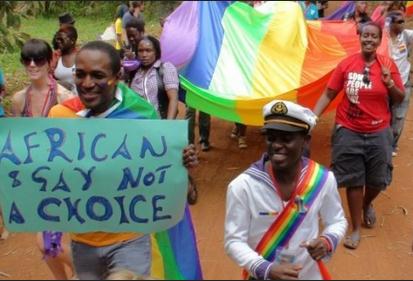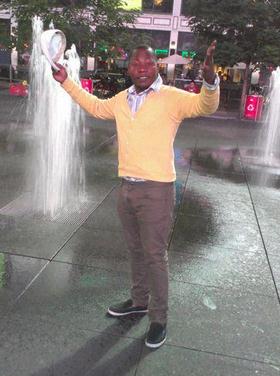
Members of the Gender and Health Organization participated in Uganda's first Pride last year, before police raided the march. Credit: Courtesy photo
Ugandan gay rights activist Andrew Waiswa lives under constant threat of persecution, always worrying police will find the secret location of gay safe houses and bust down the doors.
Waiswa is the founder and executive director of the Gender Equality and Health Organization (GEHO), a queer organization in Jinja, in eastern Uganda. He organizes accommodation and support for more than 180 gay people who have nowhere to go, except into hiding. He says the increasing number of people asking for his help overwhelms him. One safe house quickly became three.
(Waiswa has given me permission to write his full name. In fact, he insisted on it. He knows the risk but says making himself visible to the world is the only way his voice can be heard.)
“I set up the safe houses because I could not stand the pain of being picked up by the police, thrown in a cell, questioned and treated badly,” he says. “For gay people, it’s torment when you think you’ll be arrested. Most people just hang themselves or take poison or commit suicide in any way.”
For two years, between 2010 and 2012, Waiswa lived in Toronto as a refugee.
“Canada is so friendly. It’s really hard to imagine for most people [in Uganda],” he says. “I remember Church Street and The 519 and the gay bars. The rainbow flags are up. Everything is beautiful. I love it. I look forward when we have that in Uganda.”
He first left Uganda one year after parliamentarians there tabled the infamous “Kill the Gays” bill, which has made life for queer Ugandans increasingly dangerous.
“Things got so hot,” he says. “The bill has forced several of our LGBTI members into hiding. Some have been chased out of their families, some have been banished from their clans, some have been thrown out by their landlords or workplaces. All this is happening because of their sexual orientation. This increased state-sponsored homophobia has created a hostile environment for our members.”
Homosexuality is already criminalized in the country, but the proposed law increases the penalties. It proposes longer jail terms for homosexual acts than those that already exist, including a life sentence in certain circumstances and the death penalty in others.
Like many gay youth in Uganda, Waiswa’s family disowned him after they learned of his sexuality when he was 19. “I have lived a life of struggle and unforgiving suffering, but I can never give up the fight,” he says.
Just before coming to Toronto, the 33-year-old organized training for journalists on reporting objectively on gay and lesbian people. “The news is so bad here when it comes to LGBT issues. It’s all negative press.”
His organizing made Waiswa a target – and when the police found out, he was arrested.
“When I got bail, I jumped it and ran to Toronto,” he says. “I had to buy justice by bribing a police officer to give me police bond.”
While living in Toronto, Waiswa completed an international social work program at Ryerson University and volunteered at the 519 Church Street Community Centre and the Metropolitan Community Church.
Then, last summer, as Ugandans grew increasingly hostile to gay and lesbians, Waiswa decided to return home. “I could no longer stay in the comfort of Canada when my people in Uganda are suffering.
“My passion is to advocate, lobby and defend the LGBTI people, so I made a hard decision to come back to Uganda and go on with my work.”
As soon as he arrived back on Ugandan soil, Waiswa was arrested again. Thankfully, police did not lay charges, but a terrified Waiswa went into hiding. That’s when he got the idea to start a safe house and fight back. He no longer wanted to live in fear.
Those who seek help from GEHO safe houses get food; accommodation; pocket money; access to the internet; phones; and medication. GEHO doesn’t turn anyone away.
Jinja’s queer community is small and frightened but far from defeated. Waiswa ensures the locations of the safe houses remain a secret. “I have learned who to trust. I know my instinct,” he says.
Waiswa says police have twice ransacked GEHO offices looking for information – and likely the identities of members in hiding.
Waiswa is now prepared for that, too. “All our data is encrypted,” he says. “With the touch of one button, my computer will be wiped clean. They won’t find anything. It’s all saved on a separate server.”
Once the “Kill the Gays” bill passes — and Waiswa is confident it will — the situation for gays and lesbians will only get worse.
The legislation has been moving up the order paper quickly in parliament. Waiswa expects it to be debated any day. “Apart from the few members of parliament we have in our pockets, most of the rest all support the bill, so the chances are high it will pass,” he says.
Waiswa hopes Canadians, and the rest of the international community, will keep their attention on the bill and talk about how it distracts from other important and sensitive issues. “This takes attention away from child health, corruption, government theft.”
“It is being used as a tool. These are a bunch of really corrupt people who don’t really care what happens in the country. This is about power and control.”
He says many Ugandans know the bill is being used to blackmail the international community. “They are saying, ‘If you don’t do this, we will pass the bill.’ So we are trying to use diplomatic ways to discuss it and encourage people to help.”
Australia recently lodged formal diplomatic protests over the “Kill the Gays” bill, as well as a similar anti-gay law in Nigeria. Foreign Minister Bob Carr called the bills “a disgrace to human decency,” noting they “should be withdrawn.”
Last year, Canada’s foreign affairs minister, John Baird, battled Uganda’s parliamentary speaker when he condemned the bill at an international political conference in Quebec.
However, the Canadian Conservative government has more recently come under fire for its support of Crossroads, an anti-gay religious group that gets funding through CIDA for its work in Uganda.
“Sometimes it feels like no one’s listening, but we have to keep fighting,” Waiswa says. “People have to know that Ugandans are suffering and living in fear.”

 Why you can trust Xtra
Why you can trust Xtra


